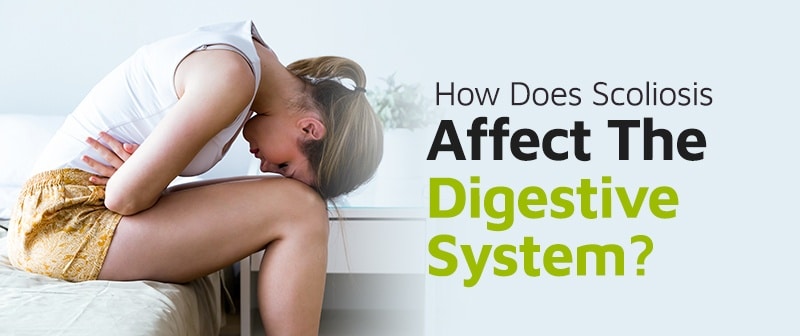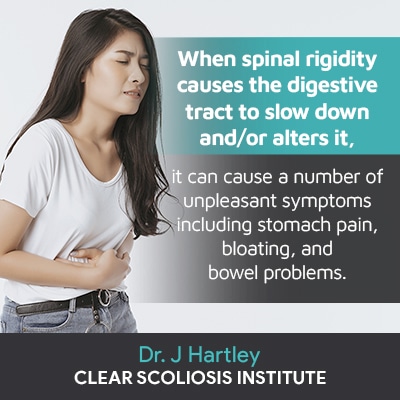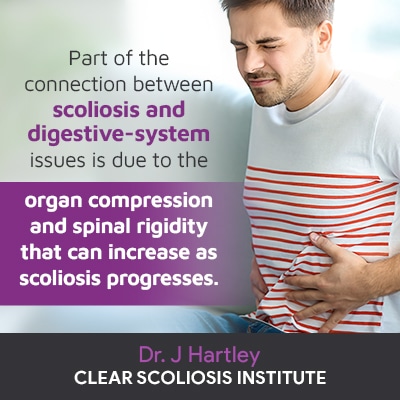
The body needs ample nourishment from a range of food sources to function optimally. As a spinal condition, it might not seem like scoliosis would have a clear effect on the digestive system, but as the brain and spine work in tandem to form the body’s central nervous system, its effects can be felt throughout the body, and not just in the back.
The digestive system consists of a group of organs working together to convert whole foods entering the body into energy and nutrients. The effects of scoliosis can be felt neurologically, structurally, and in spinal mobility: all areas that can impact the digestive system’s function/motility.
If a person is diagnosed with scoliosis, this means they have an abnormal sideways spinal curvature, with rotation, and a minimum Cobb angle of 10 degrees.
The spine plays many important roles within the body, including providing it with structure, flexibility, coordinating reflexes, protecting internal organs, and working with the brain to relay important messages.

Every time a person eats, their nerves send a signal to the digestive tract to initiate a series of activities, so if a spinal condition like scoliosis is interfering with the nerves and their ability to send/receive messages, it can impact multiple systems at work within the body.
When the spine’s vertebrae shift out of alignment due to the development of a scoliotic curve, both the spinal cord and neurology are affected. When neurology is impacted negatively, it can affect how organs function; in the chiropractic world, the effect of misalignment/nerve pressure is known as subluxation.
In order for the body to fully benefit from the food that enters it, the digestive system has to be functioning on all levels: ingestion, secretion, mixing and movement, digestion, absorption, and excretion.
If any one of the above stages of digestion are impacted, it can slow down and/or disrupt the entire process.
Now that we have spoken about scoliosis and the digestive system in general terms, let’s break down the different ways in which scoliosis can affect the digestive system’s function by addressing some common questions.
Scoliosis, particularly in severe cases, and/or if left untreated, can affect the entire body.
It is important to understand, however, that as a highly-variable condition that can range from mild to moderate and severe, no two cases are the same, including experienced symptoms.
Having scoliosis doesn’t automatically mean digestive issues are forthcoming, but in general, the more severe a condition is, the more likely a person is to develop complications, such as digestive issues.
As a progressive spinal condition, it’s in the nature of scoliosis to worsen over time, especially if left untreated, so it’s also important to understand that a person’s symptoms at the time of diagnosis aren’t indicative of where they will stay moving forward, which is why proactive treatment is so important.
We know that the spine and rib cage together help protect important organs, and we also know that as one of the main signs of scoliosis, postural changes commonly involve the rib cage and torso.
If a spine is abnormally curved, the larger that unnatural curvature gets, the more likely it is to cause postural changes, such as the development of a rib arch, and encroach upon the natural space that the organs occupy and function within.
Not only can the heart and lungs be affected by severe scoliosis, organs involved in the digestive process can also be impacted as muscles, the stomach, and surrounding organs are facing compression due to the unnatural spinal curve.
So when the stomach and organs involved in digestion (liver, pancreas, and gallbladder) are exposed to uneven pressure, this can interfere with how they absorb and digest food, as well as how they secrete bile and other fluids involved in the digestive process.
As a structural condition, scoliosis involves a structural abnormality within the spine itself, and this can cause postural changes that impact the rib cage, the stomach, and internal organs involved in the digestion, absorption, and elimination of food from the body.
In addition, once scoliosis becomes a compressive condition in adulthood, it can actually shorten the torso, which can also cause digestive problems, including stomach pain.

In mentioning that scoliosis can “become a compressive condition,” what this refers to is the difference between scoliosis in adolescents (the most common form) and scoliosis in adults.
In adolescent idiopathic scoliosis (AIS) diagnosed between the ages of 10 and 18, for patients who have not yet reached skeletal maturity, scoliosis is not commonly painful, and this is because the lengthening motion of a growing spine can counteract the compressive force of a scoliotic curve; however, once skeletal maturity has been reached in adulthood, the condition becomes compressive, known to be the main cause of condition-related pain.
In adults, the abnormal spinal curvature can actually shorten the length of the torso, reducing the space for digestive organs along the gastrointestinal (GI) tract to function optimally.
The more progression that occurs, the more rigid the spine can get, and this directly impairs the GI tract’s ability to move food particles through it efficiently.
When food particles can’t move properly through the digestive system, this can cause painful stomach bloating, acid reflux, nausea, and can also lead to bowel issues.
When spinal rigidity causes the digestive tract to slow down and/or alters it, it can cause a number of unpleasant symptoms including stomach pain, bloating, and bowel problems.
In addition, when food particles sit in the digestive tract for too long, there is also the risk of developing a blockage and/or infection.
Also known as ‘lazy bowel syndrome,’ a slow digestive system can cause abdominal pain and bloating, constipation, and the ability to produce fewer bowel movements than normal.
When the digestive system isn’t functioning optimally, this can also affect the body’s ability to absorb important nutrients from foods, which can lead to a host of issues including dehydration and malnourishment.
To be clear, while scoliosis has the potential to cause these types of symptoms, the condition is highly treatable, and in many cases, through proactive treatment, these types of complications can be avoided.
As a CLEAR-certified scoliosis chiropractor, I believe that the best way to address a patient’s digestive-system problems is to treat the scoliosis proactively; reducing the curve and compression can help improve the health of the digestive system without the use of laxatives and/or additional medications.
In addition, while there are never treatment guarantees, proactive treatment started early in a condition’s progressive line can prevent increasing condition severity and related symptoms.
While the connection between the spine and digestion might not be immediately clear to everyone, as part of the central nervous system, the spine is involved in virtually all working systems within the body.
As an abnormal sideways spinal curvature, with rotation, subluxation can cause a variety of symptoms felt throughout the body, including digestive problems.
As one of the most common telltale signs of scoliosis, postural changes can impact the body on a structural level and leave less space for internal organs to function within, and as a progressive condition, if it becomes a compressive condition (as in adults), it can shorten the length of the torso, leading to increased levels of organ compression and a further loss of space that’s needed for them to function optimally.
In addition, as a scoliotic curve increases in size, the spine loses flexibility and becomes more rigid, and this can directly affect the digestive system’s motility; the more mobility the spine has, the more the digestive system is able to move and efficiently pass food particles through.
Here at the CLEAR Scoliosis Institute, we believe in the merits of proactive treatment delivered through a conservative and functional chiropractic-centered treatment approach.
While there are never treatment guarantees, through proactive treatment started as close to the time of diagnosis as possible, a curvature reduction can impact the condition on a structural level and reduce compression, thereby relieving the pressure and uneven forces the digestive system is being exposed to, not to mention addressing affected neurology and spinal rigidity.

CLEAR provides a unique and innovative way of understanding scoliosis. Sign up to receive facts and information you won’t find anywhere else.

I was diagnosed with scoliosis in 1947 at the age of 13. My parents were given 2 options -- exercises or spinal fusion. My mother felt that exercise would be best, so I had a regimen of them to do twice a day. These ended when I was about 18, and progression of the compound curves seemed halted. I've led a full life as a dedicated piano student, scholar, school teacher and administrator, wife, and mother. Now however at age 88, and using a rollator, the scoliosis is causing problems -- shortness of breath, acid reflux, and dysphonia. In the last few days I've had a problem with constipation. Though not diagnosed, I believe that the scoliosis is a symptom of CMT disease. Would any type of lateral support help keep my spine from collapsing further? Will a laxative be beneficial for constipation?
Hello, Martha,
I imagine this is frustrating for you. Although a laxative can often help constipation, it does not help determine the cause of the constipation. It is true that scoliosis will not continue to rapidly progress once a person is skeletally mature; however, it does continue to progress normally at a much slower pace. It is likely that your scoliosis has progressed or has caused degeneration due to the length of time you have had it. To best know what is happening or if it is indeed the cause of your symptoms, an x-ray or MRI of your spine would be necessary. The information obtained can help us to determine if your scoliosis has increased, shifted positioning, or caused bone degeneration. Once we get a chance to view your spine, we can determine if you would be a candidate for care in one of our clinics. You can have an x-ray done at your primary care physician's office and have it sent to one of our CLEAR Scoliosis Institute certified clinics, or you can have an x-ray done at one of our CLEAR locations. To find the CLEAR Scoliosis Institute certified clinic nearest you, please visit our website under Find a Doctor. Please let us know if we can be of further assistance. Best of luck to you.
I am 75 old. Since birth it has been there. As I get older I see the affects on my spine, shorter torso and breathing. I have been going to a chiropractic sense was 24 years. He keeps my spine and the muscles around it as movable as possible. My spins has been fussed at age 13. It is in the part where the skull meets the spine. Just in the last 10 months my trunk is getting shorter and shorter. I have all the symptoms, like bloating, bowel problems and tummy pain. My chiropractor does the work through my mouth, CSP, ART cranial work on me every 5 weeks. Shortness of breath. I sleep with oxygen now.
Is there something I can do or take that will help me. I walk 2 miles 5 days a week and keep my weight down.
Hello, Andrea,
I imagine all of these issues have become frustrating over the years. These are very common symptoms people begin to have over time with scoliosis. We are here to help. First of all, staying active is very important. It has most likely been very beneficial for your body that you have continued with chiropractic. Unfortunately, chiropractic college does not teach how to treat or manage scoliosis, so without further training in the specialty of scoliosis, it is very limited as to what a standard chiropractor can do to help a patient with scoliosis. Many of our CLEAR Scoliosis Institute certified Doctors are happy to take a look at your x-rays/MRIs and give you their opinion as far as their recommendations and many have treated patients who have had spinal fusion. Considering your spine has been fused, modifications would need to be made as far as treatment is concerned. In order to determine if we feel you would be a candidate for the type of care we provide, I suggest contacting the clinic nearest you. To find a clinic, please visit our website under Find a Doctor. Please let us know if we can be of further assistance. Best of luck.
I'm a 53 year old male living in Los Angeles. I've had scoliosis (double curvature) since birth along with arthrogryposis multiplex congenita including fixed joints in my ankles, limited muscle development in my legs and hip joints are out of socket. I use a wheelchair for mobility. In the last 10 years I've had chronic breathing issues including several cases of pneumonia. The shape of my lungs tends to trap the bacteria/virus. Two years ago I was hospitalized with a MRSA infection and was on life support for a month including a respirator/tracheotomy. After months of rehab, I've regained most of my strength, but now have a recurring issue getting a deep breath and I take O2 to recover from exertion and my SAT levels decrease below the high 80s. I'm curious to know if digestion could be a problem with me getting. a breath as I seem to get some relief after a significant BM. I'm raised this with my pulmonologist at Kaiser, but I sense you have a stronger history with scoliosis. Let me know what you think. Thanks!
Hello, Matt,
I am sorry to hear of the issues you are having. Digestion issues can be related to a lot of things; however, scoliosis can oftentimes be a major factor in this as well as breathing. It sounds as if you have quite a few issues that I'm sure require quite a few specialists, but I feel that addressing the scoliosis component could absolutely help with these issues as well. The best place to start would be to have your x-rays/MRIs sent to the nearest CLEAR Scoliosis Center to determine if you would be a candidate for care. We do have a location close to you. To find the nearest clinic, please visit our website under Find a Doctor. Best of luck to you. There is hope.
Hello, I have been telling my dr's for the past 14 years that I have chronic back pain. I have dealt with it for years with no pain meds or anything. I have had a lot of nausea and vomiting and my lower back kills me I can't hardly walk unless I have something to help support me. My dr finally had me go for an xray and my spine is curving to the right. I saw my dr today and she said she doesn't have the results of the xray yet. I asked if she could also check me for distal muscular dystrophy and she said and I quote "Men only get that when they're young, not a grown ass woman." I have been telling them my forearms are killing me and I told my dr several years ago that one leg calf is bigger than the other and he saw I had an ankle tattoo and asked if that might have something to do with it. Any suggestions to get the help I need? I cry nearly everyday because I stay so sick and have constant pain when on my feet. My arm hurts so bad at night I have to use my other arm to pick it up and when I wake up to roll over I have to literally grab ahold of the headboard to help roll me over because I have so much back pain.
Hello, Deb,
I'm sorry to hear of the troubles you've been having. There can be many things that could cause the symptoms that you're experiencing. If there is a curvature in your lower back, it could be the cause of your back pain as well as a discrepancy in the calf muscles. Without further evaluation, there is no way to verify the cause. Our CLEAR Scoliosis Institute certified doctors specialize in the treatment of the curvatures of the spine. If you believe this to be the cause and are interested to see if your symptoms are a result of your curvature, I suggest a consultation and having your X-ray sent to the nearest CLEAR Scoliosis Center. To find the closest center, please visit our website under Find a Doctor. If there isn't a center near you, I recommend speaking with one of our doctors anyway, as they may know of someone near you they can recommend. Please let us know if we can be of further assistance. Best of luck.
I am a 64 yr. old female. I have scoliosis, multilevel spondylosis, osteopenia and just diagnosed with diabetes (taking metformin XL). I have acid reflux off and on as far back as 5 years ago. Acid reflux has reared its head again. How do I know if scoliosis is causing the acid reflux? What can I do to stop the acid reflux? Should I go to a gastro doctor? Who should I see for my scoliosis? I look forward to your response. Thank you for your time.
Hello, Nora,
Thank you for reaching out. Scoliosis can oftentimes cause digestive issues, including acid reflux. I would, however, recommend a visit to the GI specialist as there can also be other causes for the reflux. I recommend a consultation with one of our CLEAR Scoliosis Institute certified Doctors to determine if the reflux could be caused by your scoliosis or what other issues your scoliosis could be causing. To find the nearest CLEAR Scoliosis Center, please visit our website under Find a Doctor. Let us know if we can be of further assistance. Best of luck to you.
The pain is too much for me. I am also seeing a chiropractor 3 times a week.
Hello, Julie,
I am sorry to hear that. Spinal pain can be very frustrating and challenging. I am unsure of what condition or issue you are suffering with. If you are seeing a chiropractor 3x/wk you may want to make sure you are vocal with them regarding where, when, etc. the pain is bothering you. Sometimes patients have to seek assistance for pain management, a second opinion, or other avenues to explore. If you are experiencing issues with scoliosis causing pain, I would suggest contacting one of our CLEAR Scoliosis Institute certified Doctors to determine if they could help reduce and stabilize your scoliosis and help you manage the pain better. To find the nearest one of our clinics, please visit our website under Find a Doctor. Either way, I would encourage you to explore new possible options that would help reduce the pain. Best of luck. Please let us know if we can be of further assistance.